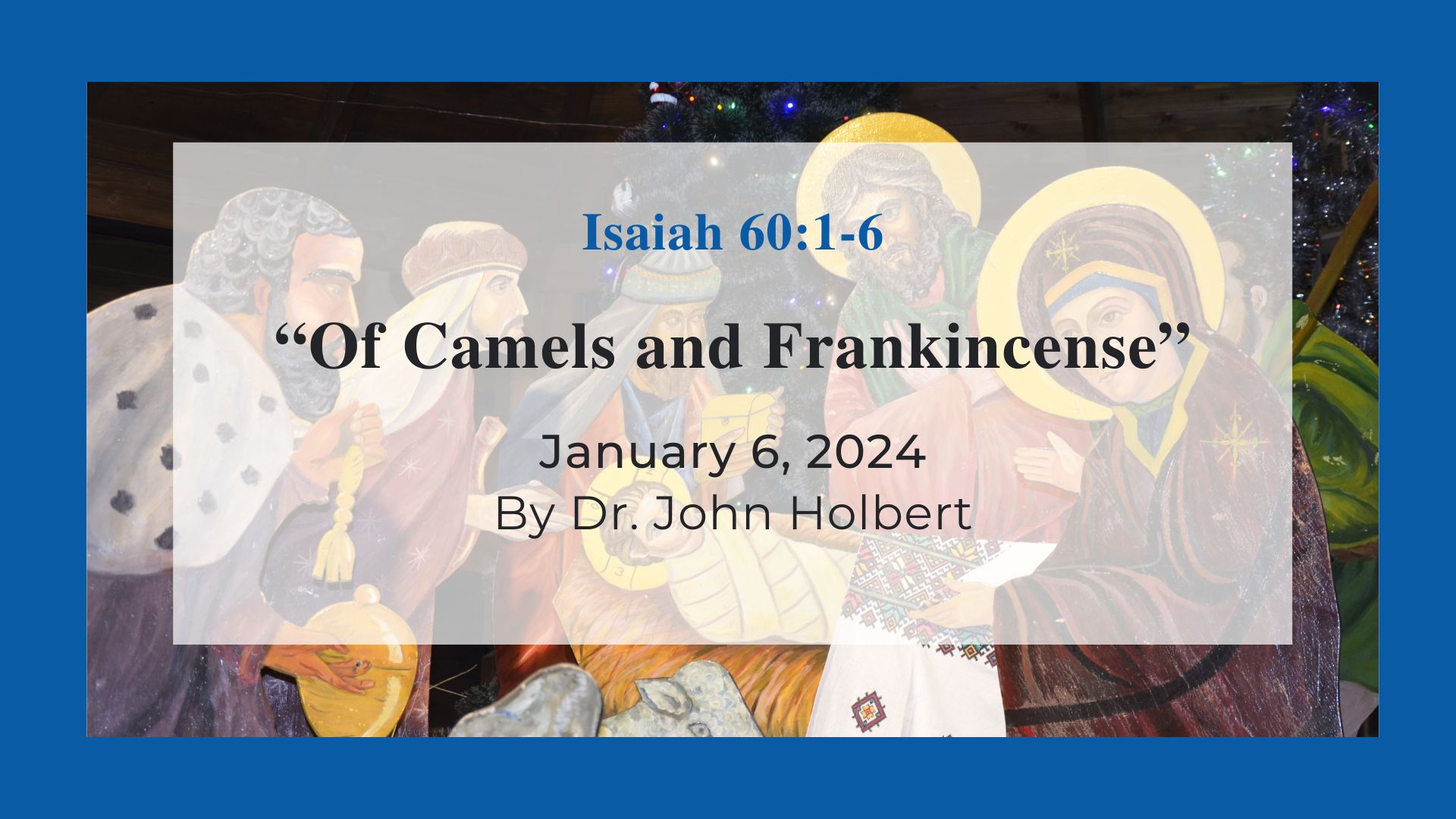Of Camels and Frankincense - Reflections on Isaiah 60:1-6, Epiphany, Year C
by John Holbert on Wednesday, December 4, 2024

To have an epiphany in our world is to have a sudden insight or a flash of inspiration. It is when an idea or a goal has been difficult to ascertain, but all of a sudden it becomes evident, a way forward has been realized. Of course, biblically, and in more ancient contexts generally, epiphany refers to the appearance of a god or goddess to a worshiper, an unveiling of a divine being heretofore shrouded in mystery or darkness. Isaiah 60 offers to us the necessary prelude to an epiphany, details of which are picked up by the author of Matthew’s Gospel when he gives to us the epiphany of Jesus to the Magi; that wondrous revelation has been celebrated on this day yearly ever since that literary creation was written nearly two thousand years ago. Yet, it has at least part of its source in the 6th-5th century Isaiah 60, whose author we can never know, but whose language has been made famous by Matthew some 500 years later.
“Arise, shine, for your light has come;
the glory of YHWH has risen upon you!” (Is.60:1)
George Frederick Handel has made these words memorable in the course of his ubiquitous oratorio, “Messiah.” They are part of an alto solo in that work’s first section, announcing that the light and glory of God have risen for us, and we bask in their beauty. The word “glory” is in Hebrew kabod, the basic meaning of which is “heavy, substantial.” In its many uses in reference to God it comes to mean the very essence of the divine one. When Moses confronts YHWH on the sacred mountain, he begs YHWH to “show me your glory” (Ex.33:18); in response YHWH shows Moses only the divine “back” (Hebrew acher, meaning “back” or “after,” perhaps “wake”). In Isaiah 60:1 the prophet claims that YHWH’s glory, YHWH’s very being, has been shown to the people, has risen over them in a burst of light.
And a good thing, too! “Just watch! Darkness is covering the earth, and deep (KJV reads “gross”) darkness the people. But upon you YHWH will arise; God’s glory will appear over you” (Is.60:2). As a result of YHWH’s appearance, “nations will come to your light, and kings to your shining dawn” (Is.60:3). Handel again may be heard here in the bass aria “The People Who Walked in Darkness,” which I have sung many times. (Now that my voice has aged and deepened, this aria is rather easier for me to sing!) In the midst of the world’s darkness, light shall dawn, and even kings will be attracted to its brightness. This verse may well be the reason that that Magi of Matthew’s story are sometimes misidentified as kings. One has only to think of Menotti’s most performed opera, “Amahl and the Night Visitors,” first written for television and then performed thousands of times on stages, in concert halls, and numerous churches. (I have sung all three of the kings at one time or another—it remains a magical work, no matter how often it is played.)
The remainder of the passage speaks of others gathered to this divine brightness: “your sons from far away shall come; your daughters in the arms of nursemaids” (Is. 60:4). This could well be a reference to the return from exile of those who were deported from Jerusalem in the 6th century BCE, but it may also have a broader meaning, promising a return to the holy city no matter in what time period it may happen. YHWH’s light draws all to its wonder.
Vss.5-6 make plainer the details that aided Matthew’s depiction of Jesus’s epiphany. “The vast gifts of the sea will be brought to you; the strength (sometimes read “wealth” NRSV) of the nations shall come to you. Herds of camels will attend you; young beasts of Ephah and Midian; all from Sheba will come, too” (Is.60:5). Midian was known in the ancient world as a place famous for camel raising and for their use in times of combat. The text ends with the mention of familar objects: “Gold and frankincense they will bring; the praise of YHWH they shall declare” (Is.60:6). The worth of gold is obvious, and the rare spice, frankincense, grown only in a few places in the ancient east, made it worth a great deal, too. It is often spoken of together in antiquity with myrrh, both of which were used in cultic rites: divine worship, funerals, festive celebrations of all sorts. Though Isaiah does not mention myrrh here, Matthew adds it to the gifts brought to the Christ child by the Magi, apparently aware of the connection of the two spices in the culture of his time.
Thus does Isaiah give to us and to Matthew the rich background of a divine epiphany: there is light in darkness; there are visits by nations and their kings to that light; there are gifts brought to the light; there is the praise of YHWH, the ultimate source of the light. The epiphany of Jesus, presented to us in the lovely scene of the Magi, borrows extensively from Isaiah’s rich portrayal of the light of YHWH rising again over God’s people. Any preacher would do well to speak to her people of these clear connections, suggesting that the Hebrew Bible is regularly the source of much of what the New Testament has to say about Jesus Messiah.
